THE NEW PLYMOUTH
THE PROJECTED COLONY A TYPE OF THE NEW LIFE OF ARID AMERICA
By WILLIAM E. SMYTHE
THE IRRIGATION AGE
Volume 08, Number 03, April 1895, Page 76-81
THE new Plymouth Colony will be made. In fact, it is at this moment in process of formation, and shows the most unmistakable evidences of early success.
This is the colony that has been foreshadowed in the editorial pages of THE IRRIGATION AGE for more than a year, and which was somewhat definitely outlined in the editorial department for December. The new Plymouth is undertaken not as a private enterprise, but as a public work, and as one feature of a propaganda of irrigation ideas. It is drawing to itself the wisdom and experience of prominent men in the West, and is getting the hearty and generous cooperation of distinguished men in the East. Plymouth Colony is intended to serve as a luminous example of what may be done by average people in making industrial and social institutions where they may realize independence and a high degree of prosperity. It has seemed absolutely necessary to make the new Plymouth. True, we have Greeley, the Mormon colonies of Utah, and the successful communities of California, but these were made without much notoriety at the time, and to quote their experience is only a little less effective in moving public opinion than to quote the experience of the ancient Greeks. To provide a living argument for the possibilities of home-making on irrigated lands, it is not only necessary to make the new Plymouth to illustrate the best ideals, but to make it in the presence of the American people to-day, and to make it with such dramatic effect that it will appeal powerfully to the popular imagination.
This is the spirit in which I have undertaken this colonial enterprise, and it is in this spirit that some of the best practical men of the West, and some of the noblest friends of humanity in the East, are lending their cooperation. The enterprise is open to the most searching scrutiny in all its phases. A large number of individuals took up the land under Desert entry, and it is from them that it is purchased. No person will have the slightest difficulty in ascertaining precisely the terms on which they sold it. The means required for the preliminary expenses of the work were raised on the personal responsibility of the projectors of the colony, and will be repaid by the colonists themselves, under a plan which is discussed further on in this article. I propose to make my own home in Plymouth Colony, and to take some of my dearest friends with me, which is perhaps the best evidence of good faith that can be furnished.
I. PLYMOUTH AS A TYPE
Now, what will Plymouth illustrate, and what results do we hope to accomplish by making it in this conspicuous way?
THE COLONIAL AND ASSOCIATIVE PRINCIPLE.
Plymouth will illustrate anew the strength of the colonial principle. That is to say, it will demonstrate that to form people into colonies or groups is far more attractive and hopeful than to attempt settlement as individuals. The conquest of Arid America is to be accomplished by associated man, rather than by individual effort. Irrigation is associative in its essence. The canal is the bond of union which gives landowners a common interest, and demands for its best results a common effort. The cooperative principle, in its true sense, has no part in the Plymouth plan. Cooperation makes all the members of a community partners in all the affairs of life outside of the family circle. Association means simply that men with a common interest shall work together,obtaining such advantages as come within the reach of their means, but not binding them as partners in any sense. In making public improvements, especially those that deal with natural monopolies, and providing public utilities, such as a libraries, parks and schools, men may associate their efforts, and the power of a united community is simply amazing. But in the field of business, whether of the farm or of the workshop, they do not cooperate, and hence the vital spark of what we know as the cooperative principle is absent. Plymouth aims at progress on associative lines, and I believe it will demonstrate that very great results are within the reach of settlers in a new country when this principle is applied. It is the natural outgrowth of a colonial plan as opposed to the plan of individual settlement, but it has none of the dangers which have rendered the name of cooperation obnoxious to thrifty, successful people.
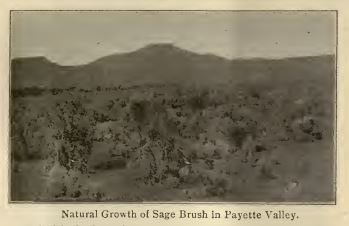
THE INDUSTRIAL SYSTEM
The second great object of the new Plymouth will be to demonstrate that there is an industrial system in Arid America which enables every family to obtain a generous living, regardless of panics, drouths, and political misfortunes, and guarantees this living for an indefinite period.
The time has been when every man who went West was moved by a spirit of speculation. This was true not only of those who rushed to new towns, but equally true of farmers. They have gambled in wheat, corn and cotton, in oranges, prunes and raisins. In their mad haste to get rich they have neglected to get a living. The only philosophical basis for the economy of farm life is that each family should own its home, and that upon that home it should realize, first of all, industrial independence by systematically, producing the things it consumes. While everybody at Plymouth will be at liberty to plan his own farm as he chooses, the aim of its projectors is to show how small farms can be organized with a view, first, to the production of what the family consumes, and, second, to the production of a wisely chosen surplus, the sale of which will realize an income available for the improvement of the home, the education of the children, and provision for old age. These two ideas are the basis of the Plymouth industrial system, and they lead, as inevitably as the waning night unto the morning, to human independence in its best, its truest, and its sweetest sense. Religious independence and political independence are well, but industrial independence - that is to say, independence in the ability to protect and sustain the loved ones at our fireside - is the vital thing. Upon the basis of the Plymouth industrial system millions of men may realize this most sacred form of human independence.
The associative principle affords still further possibilities in the direction of organizing industry. Two hundred families, possessing a fair degree of means and united in an earnest effort to make their little valley the best place on earth, can do many things to enhance their prosperity. They may unite their common capital and provide industrial plants, such as creameries and canneries, to furnish the most profitable kind of market for their surplus products. This may or may not be done at Plymouth, as the colonists shall themselves determine. But if it be done, it is not my idea that these plants shall be handled cooperatively in any sense, but merely that the colony shall invest in the plants, and then lease or sell them to parties having the necessary experience and capital to operate them. The colony would thus attempt only to make sure that it was provided with allied industries essential to its highest prosperity. The income from leasing the plants would he available for public purposes. So also in the matter of keeping up the standard of the colony's products. The measure of individual prosperity will be the standard and reputation of the products of the community. Plymouth will be well advertised, and I predict that Plymouth butter, Plymouth prunes and Plymouth canned goods will command the top of the market, as do Greeley potatoes and Riverside oranges, provided the standard be held to the highest notch. Men who are acting together in some degree of association can realize benefits from this principle that are utterly beyond the reach of individuals who have gone into a country in a scattering way, having no mutual interests or aims, and hence no esprit do corps.
So also in the matter of curing, packing and marketing fruit. I think the commission man need not apply at Plymouth. I think my friends and neighbors will prefer to get together and send their own representatives to the Eastern markets to sell the prunes, pears and apples of the famous Plymouth. So there are many other benefits to be realized from the associative principle on the side of industry.
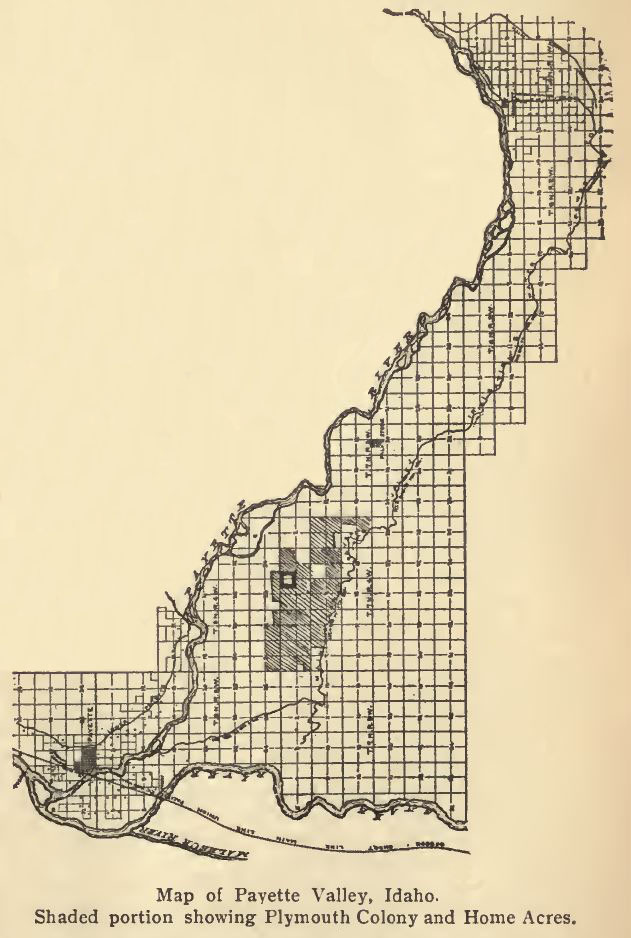
THE SOCIAL SYSTEM OF PLYMOUTH
Another most important principle in the making of colonial life in Western America will be illustrated by the social system. Isolation has been the bane of country life. The hunger for human companionship has depopulated the farms and crowded the cities with a congested and well-nigh hopeless population. Irrigation means intensive cultivation. It means a small farm unit. It leads us by a natural process to neighborhood association. It remains with us to utilize the opportunity and make the best of its hopeful possibilities.
There are two instincts common to all mankind to a greater or less degree. One is the passion to own land - the agrarian instinct. The other is the social instinct - the hunger for human companionship. These two instincts have seemed irreconcilable, but this is another problem which Arid America will solve. Plymouth, on the side of its social system, strikes its first blow at the bareness and loneliness of country life, and seeks to blend the charms of the country with the advantages of the town.
The farm village is not a new institution. It is old in Europe. It was adopted by some of the Massachusetts towns two hundred years ago. It served as the germ of the Mormon social life. In the midst of Plymouth Farms will stand the village of Home Acres. Each colonist when he purchases his farm will also receive one acre in the village, provided he will agree to build his house there. From the park in the center to the outside farm will be less than three miles, while the farms will average much nearer to the village. The farmer must ride out to his land, but his wife and children will live in the midst of neighbors, close to the school, church, post-office, store and other town institutions. There is no reason why the social life of Plymouth should not be just as attractive and satisfying as that of the best Eastern town. There is no reason why the houses should not be as pleasing in architecture, as charming in surroundings, such as lawns, trees and flowers, as the houses in the best suburban districts of our great cities. All that is required is land, water, sunshine and good taste.
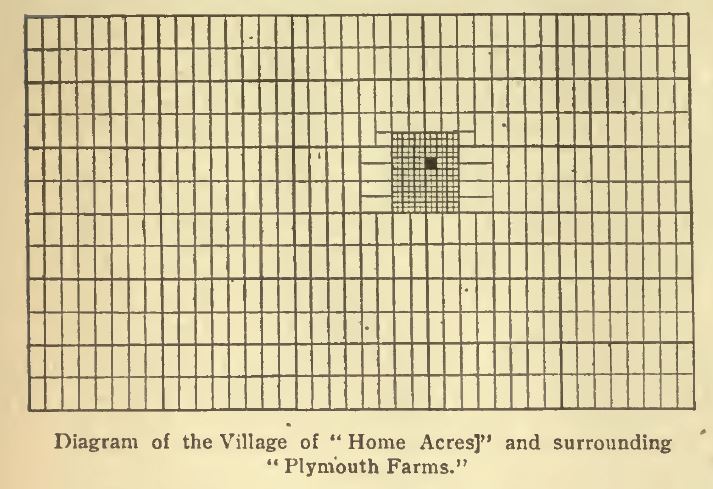
THE VILLAGE HALL
The center of social life to Home Acres will be Village Hall, which will take the form of a reproduction of the picturesque Idaho State Building at the World's Fair. It will be constructed of stone and rough-hewn logs, exceedingly attractive and unique. The lower floor will be devoted to public offices and a public hall. The upper floor will be used as a public library, and it is my earnest suggestion that this shall he named Hale Library, in honor of Edward Everett Hale, Boston's great author and divine, to whom I am indebted for a most kindly reception of the Plymouth idea, as well as of the larger plans for the irrigation propaganda. When I explained Plymouth to Dr. Hale he called in his good wife to testify that she had been compelled to resist his impulse to emigrate once in each six months for forty years. His great heart, at least, will be with us in the new Plymouth.
Home Acres should have good side-walks and streets. It is with a good deal of timidity that I break the news that we propose to have the farm houses of Plymouth Colony lighted by electricity, provided colonists will "lend a hand," to quote the famous phrase of Dr. Hale. Power can be provided by building a short but wide canal, and the colonists can do it by their common labor during a few weeks in the autumn, when they have little else to do. We assume that the plant would cost, complete, not more than $10,000, and that an annual charge of $10 per family would supply houses with all the light they could use, as well as power for domestic purposes, such as running sewing machines. It would also furnish light for streets, stores, public buildings, etc. Electricity is to play a most important part in the evolution of our new colonial life. Later colonies will doubtless surpass Plymouth in this regard, but we must have electric light in the houses. I hate coal oil !
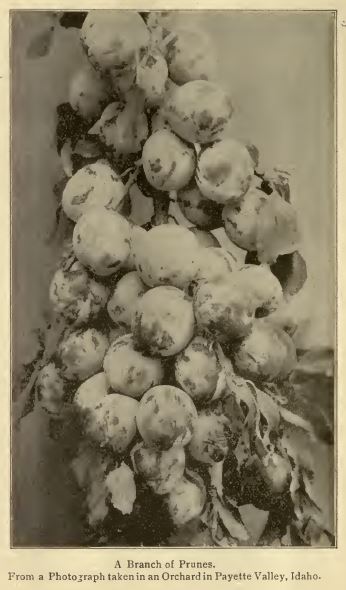
On such a social system as that of Plymouth there is simply no reason why farmers and their families should not enjoy all the good things of town life, with a minimum of its drawbacks. Think of winter in the new Plymouth! The barns and store-houses bursting with the products of prosperous husbandry; ample feed for the fowls and animals of the barn yard; the best of literature and current newspapers and periodicals available at the library, with lectures and entertainments in the Village Hall; and best of all, the long evenings with our dear ones at our own sovereign firesides!
There is not a feature of the industrial and social systems outlined which has not been tried and vindicated by experience somewhere. Plymouth is only new in bringing into association in one colony the best features of various experiences, and in attempting to bring within the reach of plain, average people the advantages of our modern civilization. There may be those who doubt the wisdom of trying to realize so high an ideal. But the thing must be done, because civilization pleads for progress - because humanity cries aloud for more room in which to build its habitations. Plymouth is a necessity. And it is with the utmost gratification that I inform the friends of the West that it is on the highroad to success. Among the many people who have applied for membership not one has talked about profits per acre, but all have responded heartily to the idea of individual independence and the highest order of social conditions. Men are hungry for these things, and Arid America is bursting with raw material of the food which can satisfy their appetite for something better.
II. THE CHOSEN VALLEY
Mary Halleck Foote, the distinguished novelist, who, by the way, is a resident of Southern Idaho, recently published a charming story, entitled "The Chosen Valley." The expression applies very happily to the Plymouth Colony undertaking, since the Payette Valley has been chosen, like the one in which the scene of her story was laid, with the most careful thought of the prosperity and happiness of settlers.
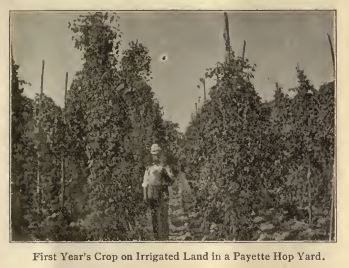
LOCATION OF THE VALLEY
The Payette Valley is located in the extreme southwestern portion of Idaho, close to the boundary of Oregon. It is about 400 miles from the Pacific Ocean. It is sixty miles from the capital at Boise, and many important mining camps are located within a short distance in the surrounding mountains. The Payette River flows through one of those narrow and picturesque valleys which serve to develop the most pleasing aspects of rural life in the arid region. The valley is about thirty miles long and four miles wide at the place chosen for the colony.
About 5,000 acres of land have been selected and contracted for from various individuals, at the rate of $20 per acre, with an additional charge of $3 per acre for that part of the land cleared of sage brush and ready for immediate cultivation. This price includes a perpetual water right for irrigating the land.
The soil of the Payette Valley is very deep and rich, and adapted to perfect drainage. It contains the aggregated and condensed richness of the vast areas of vegetable growth that have been accumulating for ages on the mountain sides. An analysis shows it to be pre-eminently rich in all the mineral and vegetable elements, and therefore favorable to the growth of cereals, vegetables, fruits and everything else which it is desirable to include in a scheme of diversified farming. The natural growth is sage brush, which is recognized as the certain evidence of rich soil. In the Payette Valley the sage brush growth attains extraordinary proportions, and the fertility which this fact foretold to early observers has been fully realized by actual experience.
HOW THE VALLEY IS WATERED
The Payette River is a perennial stream of noble proportions. It is fed by the melting snows of the Sawtooth mountains, and has a very large drainage area. The average flow of the stream is over 3,000 cubic feet per second, or sufficient to irrigate 150,000 acres of land, while not more than 60,000 acres can ever call upon it for water. This is a matter of the most vital importance to the settler. He knows that there can never be a question about his water supply. A substantial canal has been built at a cost of about $400,000 to cover the best lands. This canal is some forty miles long, having an average width of twenty-five feet, and an average depth of five and a half feet.
PRODUCTS OF THE VALLEY
When it is said that the Payette Valley is in the milder portion of the temperate zone, with an altitude of 2,300 feet above the sea level; that the soil is rich, deep and kindly; that the water supply is unfailing, and that there is entire freedom from hail-storms and destructive winds, it does not need to be added that all the vegetables, cereals grasses, small fruits and orchard fruits, together with all the meat products and those of the dairy, can be successfully grown. The valley, is famous, however, for its prunes, pears and apples.
PROFITS OF THE FARM AND ORCHARD
Under the industrial system which it is proposed to adopt at Plymouth, each colonist will first aim to obtain a prosperous living from the soil. It is impossible to estimate the average profit per acre upon the surplus product beyond the living. This profit will vary much with the skill and enterprise of individuals. It will vary also with the class of crops produced. It will vary still again with the use to which this crop is put. For instance, the Payette Valley produces from four to nine tons of alfalfa per acre, and six tons is a fair average. It sells in the stack at all the way from $5 to $12 per ton. Taking the lower price and the average yield as the basis of an estimate, it is seen that alfalfa raised for sale in the stack would bring $30 per acre. But one farmer who put ten acres into alfalfa and fed it to hogs last season, fattening them on grain for which he paid $250, realized $960 for his hogs. Deducting the price paid for the grain leaves a net price of about $700, or $70 per acre for alfalfa raised for the purpose of feeding to hogs David Gorrie, of Payette, sold his prunes for one-and-a-half cents per pound, and they netted him $250 per acre. Apples sell for 3 cents per pound, and six-year-old trees average 200 pounds each, earning $300 per acre. While it is likely that the largest ultimate profits will come from the orchards, it is equally certain that the first profits will come from tomatoes, sweet corn, peas, beans, cucumbers and other vegetables, which will be disposed of at the colony's cannery.
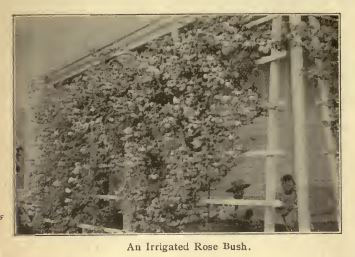
A MARKET AT HOME
It fortunately happens today that each of the arid States is importing very large quantities of things it ought to produce at home. This is so because mining, the range stock industry, and the growth of railroad towns have kept in advance of diversified agriculture. Thus it will be very easy to select a number of surplus crops which can be disposed of profitably in the large and growing home markets. It will be many years before colonies organized on the Ply-mouth plan ship very largely to distant markets, although certain crops of very superior quality will naturally seek markets, near or far, which can afford to pay the highest prices.
THE COST OF STARTING
The amount of money required to start a home in Plymouth Colony is also largely dependent upon the individual. Some men have started with almost nothing in Idaho, and accumulated a competence of $10,000 in a few years. Some have started with considerable capital and have not fared half as well. But as Plymouth Colony is designed to serve an important purpose as a type, it is eminently desirable that colonists should have sufficient capital to make a good showing in the matter of their homes, improvements and surroundings. One of the best settlers, and one of the most prosperous in the Payette valley to-day, started with $350, and says he would not have known what to do with more than $500. Nevertheless, the projectors of Plymouth Colony hope the new Pilgrim Fathers will possess one thousand dollars each as a rule, and if they have more, the character of homes and surroundings in the farm village of " Home Acres" will be just that much more attractive and satisfying.
Here is what can be done with $1,000:
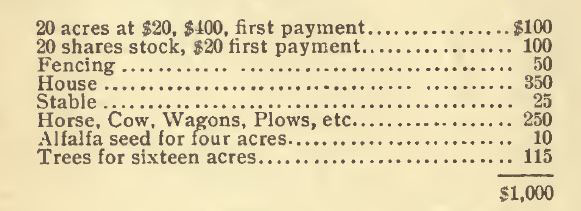
EMPLOYMENT FOR COLONISTS
There will be a large amount of employment for colonists who may desire to avail themselves of the opportunity. They will be given preference over outside workmen in making all the improvements upon the land, and in the mechanical trades employed in the erection of buildings, industrial plants, etc. There is also much demand for extra help when the hops and fruit are being harvested upon the older places in the valley. There is a demand for 500 hands in hop-picking alone for thirty days in each harvest season. This gives employment not only to adults, but to children who-wish to work.
Idaho is well timbered and the Payette valley is particularly favored in the matter of a cheap and abundant lumber supply. There are millions of feet of the best pine and fir timber on the Payette river, which is floated down the stream to Payette and there manufactured into lumber. Rough lumber sells for $10, and from $12.50 to $25 for planed and finishing per 1,000 feet.
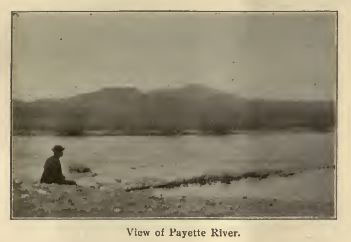
On the Payette river, forty miles above Plymouth, are good fields of bituminous coal. It is used now by the people in the immediate neighborhood. A railroad is certain to he built from the mines to the line of the Union Pacific at Payette, passing directly through Home Acres and Plymouth Farms.
Payette, Idaho, which adjoins the Plymouth Colony lands, is an attractive little town on the Oregon Shortline railroad, forty miles from its junction with the Oregon Railway and Navigation Company. Payette has a first-class school, four churches, good hotel, bank, large stores, two sawmills,and other industries. It contains many fine dwellings, and is surrounded by beautiful drives. Orchards and gardens are in an advanced stage of development, as water has been supplied for irrigation for several years.
One of the pleasantest features in connection with the location of Plymouth is the easy access to resorts in the mountains.
The eminent authority, Prof. L. H. Bailey, the horticulturist of Cornell University, in Annals o Horticulture for 1893, pays the following high tribute to Idaho's horticultural product: Second to the display of citrus fruits from California, the Pacific Northwest arrested the attention of visitors. Idaho, Oregon and Washington held a prominent place from the first, although Oregon exceeded the other two in the amount of fresh fruit exhibited. The fruits of this entire region are remarkable for their enormous size and high color, and particularly for the strange influence of climate which they show.
The display of apples from the Northwestern States - Idaho, Oregon and Washington - were characterized by fruits of enormous size, high color and remarkable freedom from scab. To the Eastern man the most interesting variety from these States was the Yellow Newton Pippin, which is the leading apple over a great territory there, and which is twice as large as the same apple grown in the Hudson River Valley.
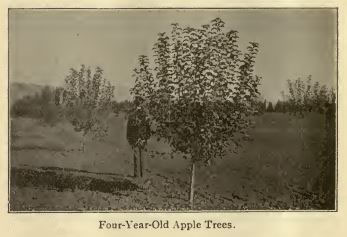
III. THE BUSINESS PLAN
The Plymouth Colony lands will be sold, including perpetual water rights, for $20 per acre. But this is not the entire cost involved in securing the benefits of the colony. The expense of the preliminary work in organizing the colony must be repaid to the projectors, who have raised and advanced it. There must be a fund for improvements, such as country roads and village streets, the erection of the public hall, and the provision of other facilities essential to the comfort and prosperity of the people. It is these improvements and facilities which render Plymouth unique, and make it serve the purpose of a type of the best industrial and social institutions in Western America.
The land and water rights being sold to the colonists at actual cost, it is proposed to incorporate the Plymouth Company, in which each colonist must purchase one share of stock for each acre of land. While many of the details have been purposely left open to be settled by the colonists themselves, it is probable that the price of the stock will be $10 per share. Of the tract of five thousand acres, 480 acres will be reserved for the village site, which leaves 4,520 to be sold at $20. At $10 per share the stock would realize $45,200. The total investment for each colonist will be $30 per acre. This covers the cost of his farm, of his acre lot in the village, and his share in all the improvements and industries. Readers of THE IRRIGATION AGE need not be told that this price is very low for raw land alone, if of the best quality, and if supplied with a reliable water right.
The plan of payments is as follows:
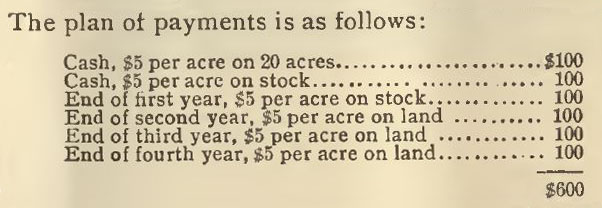
One of the most interesting and valuable features of the new Plymouth will be the illustration which it furnishes of what can be done by a party of people, possessing small means, who associate themselves together to create a symmetrical community. By adding $10 per acre to their investment, which still permits them to get the land at a very low price, they obtain the home acre and make sure of the advantages of neighborhood association. They get the benefit of good streets with shade trees, of a commodious town hall set in the midst of a beautiful park, of a public library, electric light plant and the other features of modem civilization. But this is not all.
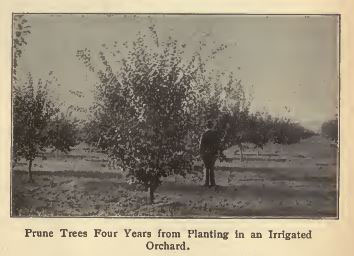
ALLIED INDUSTRIES
The presence of certain industrial plants is essential to the highest prosperity of the Plymouth colonists, in order that their products may have a home market, and be manufactured into the most profitable and salable form, thus supplying a part of the demand which is now satisfied chiefly by importations from other States. It is estimated that a creamery can be erected and equipped for $4,500; a canning factory for $4,500; a starch factory, $5,000; an electric light and power plant, $10,000; a hotel, $5,000. Be-sides the $45,200 realized from the sale of stock, a considerable sum will be realized from the sale of business property and residence sites to the population which comes in to conduct stores and industries. There will thus be ample funds for all these improvements. It is not designed that the community shall operate the industrial plants, but that they shall lease them, or, better still, sell them on easy payments. This would give the colony a revolving fund of about $50,000, which could be used for the creation of industries as the need arises. Village Hall and the electrical plant will probably remain as permanent investments. There can be no question about the prosperity of a community which takes for its foundation the agricultural scheme of Plymouth, with its systematic production of what the people consume, and its wisely chosen surplus crop, with its allied industries and its charming social possibilities.
The Plymouth Colony lands are eight and a half miles distant from the Oregon Short Line Railroad, but arrangements are already under way for a railroad to cover this short distance, and it is hoped to have its construction begun by the time the main body of the colonists reach Plymouth next August. The new Plymouth will then be dedicated with impressive ceremonies, as a type of twentieth century civilization in Western America.
I put Plymouth Colony boldly forward as a legitimate and most important feature of the propaganda of irrigation ideas. I believe it will benefit every community and every State which desires to obtain good settlers. I believe the making of this colony in accordance with high ideals should prove to be a real and lasting service to the country and to the race.
